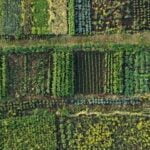Organic fertilizers have gained tremendous popularity in recent years as more and more people are turning to natural and sustainable solutions for their vegetable gardens. One such organic fertilizer that has caught the attention of gardeners is rabbit manure. Known for its rich nutrient content and ability to enhance soil health, rabbit manure is becoming a go-to choice for those looking to maximize the productivity of their vegetable gardens.
When it comes to organic fertilizers, rabbit manure stands out due to its exceptional nutrient profile. Packed with essential nutrients like nitrogen, phosphorus, and potassium, rabbit manure provides a balanced diet to plants, promoting healthy growth and abundant harvests. In addition to these macronutrients, it also contains micronutrients like calcium, magnesium, and zinc that play crucial roles in plant development.
Not only does rabbit manure deliver vital nutrients to your vegetables, but it also contributes significantly to soil health. Its high organic matter content improves the soil’s structure, increasing its water-holding capacity and aeration. This allows plant roots to penetrate easily into the soil and access nutrients and moisture efficiently. Moreover, rabbit manure enhances microbial activity in the soil, creating a thriving environment for beneficial bacteria and fungi that aid in nutrient breakdown and availability.
By incorporating organic fertilizers like rabbit manure into your vegetable garden routine, you can support sustainable gardening practices while reaping the benefits of healthy crops. Understanding how rabbit manure affects soil health is key to harnessing its full potential in your garden.
In the following sections of this article, we will delve into the nutrient content of rabbit manure, best practices for applying it to vegetable gardens, comparative analysis with other organic fertilizers, debunking common misconceptions surrounding its use, highlighting success stories from experienced gardeners using it effectively, as well as discussing any potential risks or precautions associated with its application.
Stay tuned as we explore the world of rabbit manure and unravel its secrets to achieving thriving vegetable gardens.
Understanding the Nutrient Content of Rabbit Manure
Rabbit manure is a valuable organic fertilizer that can greatly benefit vegetable gardens. Understanding the nutrient content of rabbit manure is essential in order to make the most of this natural resource.
One of the key nutrients found in rabbit manure is nitrogen. Nitrogen is an essential component for plant growth and plays a crucial role in the development of green, leafy vegetables. Rabbit manure contains a significantly higher amount of nitrogen compared to many other types of animal manure. This makes it an excellent choice for gardeners looking to boost the nitrogen levels in their soil.
Apart from nitrogen, rabbit manure also contains other important nutrients such as phosphorus and potassium. These nutrients are vital for overall plant health and play significant roles in root development, fruit production, and disease resistance. The ratio of these nutrients can vary depending on factors such as diet and age of the rabbits, but generally, rabbit manure provides a well-balanced blend of essential minerals.
To better understand how rabbit manure enhances soil health, it is important to consider its organic matter content. Rabbit manure has high levels of organic matter, which improves soil structure and water-holding capacity. This means that when you add rabbit manure to your vegetable garden, you are not only enriching it with essential nutrients but also improving the overall health and fertility of the soil.
How Rabbit Manure Enhances Soil Health
The Nutrient Content of Rabbit Manure
Before delving into how rabbit manure enhances soil health, it is important to understand the nutrient content of this organic fertilizer. Rabbit manure is highly valued among gardeners due to its high nutrient content. It is rich in essential macronutrients such as nitrogen, phosphorus, and potassium, which are crucial for plant growth and productivity.
Nitrogen plays a vital role in promoting leafy green growth, while phosphorus helps in root development and fruit production. Potassium aids in overall plant health, disease resistance, and improves the flavor and quality of vegetables. In addition to these primary macronutrients, rabbit manure also contains secondary nutrients like calcium and magnesium along with trace elements such as zinc and iron.
Furthermore, rabbit manure has a high organic matter content that helps improve soil structure by enhancing its ability to retain moisture and nutrients. This results in improved water infiltration and drainage capabilities. Additionally, the organic matter present in rabbit manure acts as a slow-release fertilizer, steadily providing nutrients to plants over time.
The Role of Rabbit Manure in Soil Health
One of the key ways rabbit manure enhances soil health is through its ability to increase soil fertility. The nutrients found in rabbit manure contribute to plant growth and vigor. By enriching the soil with these essential macronutrients, vegetable gardeners can ensure their plants have access to the necessary elements for optimal growth.
Rabbit manure also improves soil structure by promoting the growth of beneficial microorganisms that break down organic matter and release additional nutrients for plants. These microorganisms help create a healthy ecosystem within the soil, enhancing its overall fertility and vitality. As a result, vegetable gardens treated with rabbit manure often have increased nutrient availability for plants throughout the growing season.
Moreover, rabbit manure also improves soil texture. Its fibrous nature helps loosen compacted soil, allowing better root penetration and aeration. This enables plant roots to access oxygen and nutrients more easily, further enhancing their growth and overall health.
In summary, the nutrient content of rabbit manure, along with its ability to improve soil structure, contributes to enhanced soil health. The next section will explore the best practices for applying rabbit manure to vegetable gardens to maximize its benefits while minimizing potential risks.
Applying Rabbit Manure to Vegetable Gardens
When it comes to using rabbit manure as a fertilizer in your vegetable garden, there are some best practices to keep in mind. By following these guidelines, you can maximize the benefits of rabbit manure while minimizing any potential risks.
First and foremost, it’s important to properly compost the rabbit manure before applying it to your vegetable garden. Fresh rabbit manure is high in nitrogen and can burn plants if applied directly. Composting the manure allows for decomposition and helps to eliminate harmful pathogens, making it safe for use as fertilizer.
To compost rabbit manure, mix it with other organic materials such as straw, leaves, or wood shavings. Aim for a ratio of about one part manure to three parts carbon-rich materials. Turn the compost pile regularly to ensure proper decomposition and allow it to age for at least six months before using it in your garden.
Once your rabbit manure is properly composted, you can apply it to your vegetable garden. Start by spreading a thin layer of the compost over the entire garden bed. Avoid piling the compost directly on top of plant stems or crowns as this can cause rotting. Gently work the compost into the soil using a garden fork or tiller.
To ensure even distribution of nutrients, consider side-dressing your plants with additional compost during their growing season. Side-dressing involves adding small amounts of compost around the base of each plant without disturbing the roots. This method provides a slow release of nutrients throughout the growing season.
By following these best practices for applying rabbit manure to your vegetable gardens, you can create healthy soil and promote robust plant growth. Remember that moderation is key – while rabbit manure is beneficial, excessive application can lead to an imbalance in nutrient levels. Regular testing of your soil’s nutrient content will help guide you in determining how much rabbit manure is needed for optimal results.
| Best Practices for Applying Rabbit Manure to Vegetable Gardens |
|---|
| – Properly compost the rabbit manure before use |
| – Mix the manure with other organic materials such as straw or leaves for ideal decomposition |
| – Spread a thin layer of compost over the garden bed, avoiding direct contact with plant stems |
| – Gently work the compost into the soil using a garden fork or tiller |
| – Consider side-dressing plants with additional compost during their growing season to provide a slow release of nutrients |
| – Apply rabbit manure in moderation and regularly test soil nutrient levels for optimal results |
Rabbit Manure vs. Other Organic Fertilizers
Organic fertilizers are an excellent option for vegetable gardens as they provide numerous benefits. In this section, we will compare rabbit manure to other organic fertilizers commonly used in vegetable gardens.
Nutrient Content
Rabbit manure is rich in essential nutrients that are beneficial for plant growth. It contains high levels of nitrogen, phosphorus, and potassium (NPK), which are crucial for healthy plant development. Additionally, it also contains micronutrients like calcium, magnesium, and zinc, which play a vital role in plant nutrition.
Comparatively, other organic fertilizers such as compost or cow manure may have similar nutrient content to rabbit manure. However, the nutrient ratio can vary based on factors such as the diet of the animal producing the manure or the composting process used. Understanding the specific nutrient content of each organic fertilizer is important in determining the best choice for your vegetable garden.
Soil Health Benefits
One advantage that sets rabbit manure apart from other organic fertilizers is its ability to improve soil structure and fertility. Rabbit manure has a high moisture retention capacity due to its fibrous nature, making it an ideal choice for improving sandy or loamy soils.
Furthermore, rabbit manure enhances soil health by promoting beneficial microorganism activity. The presence of these microorganisms helps break down organic matter in the soil into nutrients that can be easily absorbed by plants. This natural process enriches the soil’s overall fertility and supports a healthier root system for better plant growth.
While other organic fertilizers offer similar benefits to some extent, rabbit manure’s unique characteristics make it a valuable choice for enhancing soil health in vegetable gardens.
Environmental Impact
When comparing rabbit manure to other organic fertilizers like synthetic alternatives or chemical-based options commonly used in conventional agriculture, there are significant environmental advantages to using rabbit manure.
Rabbit manure is a renewable resource as it can be continuously produced through rabbit farming practices. Its production does not contribute to harmful practices like deforestation or mining, as seen with some synthetic fertilizers.
Moreover, the use of rabbit manure reduces dependence on chemical fertilizers that can potentially harm the environment through runoff into waterways or contribute to greenhouse gas emissions during production. Rabbit manure’s organic nature minimizes the risks associated with environmental pollution.
Common Misconceptions about Using Rabbit Manure in Vegetable Gardens
Myth 1: Rabbit manure attracts pests
One common misconception about using rabbit manure in vegetable gardens is that it attracts pests. Some gardeners may worry that the odor or composition of rabbit manure will attract unwanted insects or critters to their garden. However, this is not necessarily true. In fact, properly composted rabbit manure can actually help deter pests and protect your vegetables from damage. The high nitrogen content in rabbit manure helps plants grow healthy and strong, making them less attractive to pests.
Myth 2: Rabbit manure burns plants
Another misconception is that using rabbit manure as fertilizer can burn plants. While it is true that fresh rabbit manure contains high levels of nitrogen, which can be harmful to plants if applied directly without composting, properly aged and composted rabbit manure poses no risk of burning plants.
Composting breaks down the nitrogen into a form that is more readily available for plant absorption and reduces the risk of nutrient imbalance or toxicities. It is important to allow rabbit manure to compost for at least six months before using it as a fertilizer.
Myth 3: Rabbit manure spreads diseases
There is a concern among some gardeners that using rabbit manure in vegetable gardens may spread diseases that rabbits are susceptible to, such as coccidiosis or botulism. While it is true that these diseases can be present in rabbit waste, taking proper precautions during the composting process can greatly reduce the risk of transmitting any pathogens to your plants.
Composting with temperatures above 140°F (60°C) for an extended period of time will effectively kill any potential pathogens present in the waste materials.
By debunking these common misconceptions, it becomes evident that using properly composted rabbit manure in vegetable gardens has numerous benefits and poses minimal risks when compared with other organic fertilizers. It is an environmentally friendly and sustainable option that not only enhances soil health but also promotes the growth of healthy and nutritious vegetables.
Success Stories
Success Stories: Testimonials from Vegetable Gardeners Using Rabbit Manure
Rabbit manure has gained popularity as an organic fertilizer for vegetable gardens due to its numerous benefits. Many vegetable gardeners have experienced great success in using rabbit manure, and their testimonials serve as proof of its effectiveness in promoting healthy plant growth and high yields.
One satisfied vegetable gardener, Sarah Thompson, shared her success story after incorporating rabbit manure into her garden routine. She stated, “Ever since I started using rabbit manure as a fertilizer, I have noticed a significant improvement in the overall health and vitality of my vegetables. They are greener, more robust, and produce larger harvests than ever before. Plus, the taste is absolutely exceptional.”.
Another testimonial comes from Mark Johnson, who initially had doubts about using rabbit manure but decided to give it a try. He reported, “I was amazed by the results. My vegetables grew much faster and had fewer pest issues compared to previous years. The soil also seemed much richer and had better water retention. Rabbit manure has become my go-to organic fertilizer.”.
| Gardener | Testimonial |
|---|---|
| Sarah Thompson | “Ever since I started using rabbit manure as a fertilizer, I have noticed a significant improvement in the overall health and vitality of my vegetables. They are greener, more robust, and produce larger harvests than ever before. Plus, the taste is absolutely exceptional.” |
| Mark Johnson | “I was amazed by the results. My vegetables grew much faster and had fewer pest issues compared to previous years. The soil also seemed much richer and had better water retention. Rabbit manure has become my go-to organic fertilizer.” |
These success stories highlight the transformative effects of rabbit manure on vegetable gardens. The nutrient-rich composition of rabbit manure contributes to improved plant growth, healthier soil, and increased harvests. Vegetable gardeners around the world have witnessed these benefits firsthand and continue to use rabbit manure as a trusted organic fertilizer.
Potential Risks and Precautions when Using Rabbit Manure in Vegetable Gardens
While rabbit manure can be a valuable addition to a vegetable garden, it is important for gardeners to be aware of the potential risks and take necessary precautions when using this organic fertilizer. It is crucial to handle and apply rabbit manure properly in order to avoid any negative impacts on plant health and food safety.
One potential risk associated with using rabbit manure is its high nitrogen content. While nitrogen is an essential nutrient for plant growth, excessive levels can lead to nitrogen burn or over-fertilization. It is important to use rabbit manure in moderation and follow recommended guidelines for application rates. Testing the soil before applying the manure can also help determine if additional nitrogen is needed or if the existing levels are already sufficient.
Another consideration when using rabbit manure is the possibility of introducing weed seeds or plant pathogens into the garden. Rabbits often consume various plants, including weeds, which means their droppings may contain viable weed seeds. Additionally, certain diseases can be transmitted through animal waste.
To mitigate these risks, it is advisable to compost the rabbit manure before using it as fertilizer. Composting at high temperatures (above 140°F) can help kill weed seeds and pathogens, making the manure safer for use in vegetable gardens.
Lastly, it is important to note that rabbits may be fed with commercial feeds or hay that could contain traces of pesticides or other chemicals. These substances can potentially be present in the rabbit manure and subsequently transferred to vegetables if not properly handled. To minimize this risk, it is recommended to source rabbit manure from trusted suppliers who adhere to organic farming practices or use rabbits that have been raised under controlled conditions where chemical inputs are minimized.
Conclusion
In conclusion, rabbit manure is indeed a beneficial and effective organic fertilizer for vegetable gardens. As discussed in this article, it offers numerous advantages such as its nutrient-rich content and ability to enhance soil health. Rabbit manure provides essential nutrients like nitrogen, phosphorus, and potassium that promote the growth and development of vegetables. It also improves soil structure, fertility, and water-holding capacity, creating the ideal environment for plants to thrive.
When applying rabbit manure to vegetable gardens, following best practices is crucial. It is important to properly compost the manure to eliminate any potential risks of pathogen contamination.
Adequate composting ensures that the nutrients are more readily available for plant absorption and reduces the risk of burning or damaging the plants due to excessive nitrogen levels. Additionally, it is advisable to apply rabbit manure in moderate amounts throughout the growing season rather than all at once, allowing plants to receive a continuous supply of nutrients.
Comparatively speaking, using rabbit manure as an organic fertilizer has several advantages over other alternatives. It has higher nutrient content compared to other types of animal manures like cow or horse manure. Furthermore, it tends to have fewer weed seeds than some other organic fertilizers such as compost or poultry manure. This makes rabbit manure a desirable choice for vegetable gardeners who prioritize clean and nutrient-rich soil.
Although there may be misconceptions surrounding the use of rabbit manure in vegetable gardens, success stories from gardeners who have experienced its benefits firsthand speak volumes about its effectiveness. Testimonials from experienced gardeners highlight improved plant growth, increased yields, and overall healthier plants when using rabbit manure as a fertilizer.
However, like with any type of fertilizer or gardening practice, there are potential risks and precautions associated with using rabbit manure in vegetable gardens. These include the risk of introducing pathogens if proper composting procedures are not followed and potential nitrogen burn if excessive amounts are applied. It is important for gardeners to educate themselves and take necessary precautions to mitigate these risks.
Frequently Asked Questions
Can I put rabbit manure directly on my vegetable garden?
Yes, you can put rabbit manure directly on your vegetable garden. Rabbit manure is considered one of the best natural fertilizers for plants due to its high nutrient content. It is rich in essential nutrients like nitrogen, phosphorus, and potassium, which are crucial for plant growth.
However, it’s important to note that fresh rabbit manure is high in ammonia and can burn plants if applied directly without composting or aging. Therefore, it is recommended to compost the manure first before applying it to your garden beds.
Can you put too much rabbit manure in your garden?
While rabbit manure is a fantastic fertilizer for gardens, it is possible to use too much of it. As with any type of organic matter, excessive amounts of rabbit manure can lead to an imbalance of nutrients in the soil.
This imbalance may cause issues such as nutrient leaching or nutrient toxicity that could harm plant health and hinder their growth. To avoid overdoing it, it’s advisable to follow recommended application rates and consider conducting a soil test to determine the optimal amount of rabbit manure needed for your specific garden.
Is rabbit manure good for tomatoes?
Yes, rabbit manure is particularly beneficial for tomato plants. Tomatoes are known as heavy feeders; they require ample nutrients throughout their growing season to produce healthy foliage and abundant fruit. Rabbit manure provides a great source of nitrogen, which promotes vegetative growth and lush green foliage in tomatoes.
Additionally, the balanced composition of nutrients found in rabbit manure helps boost overall plant health and disease resistance in tomatoes. However, as mentioned earlier, make sure to compost or age the fresh rabbit manure before applying it as a fertilizer for tomatoes or any other vegetable plant to avoid burning the roots or causing nutrient imbalances.

If you’re looking to get into vegetable gardening, or are just looking for some tips on how to make your current garden better, then you’ve come to the right place! My name is Ethel and I have been gardening for years. In this blog, I’m going to share with you some of my best tips on how to create a successful vegetable garden.





